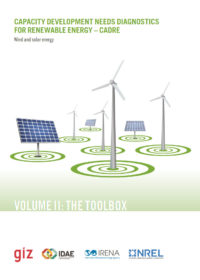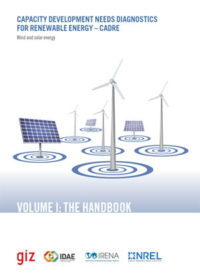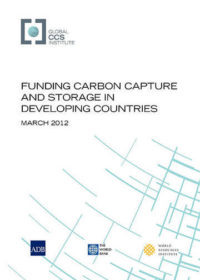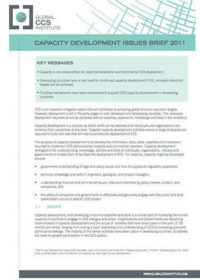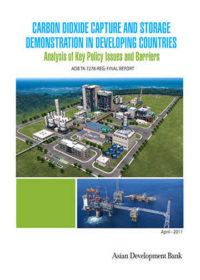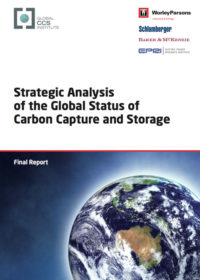Resources
Publications
Our publications, reports and research library hosts over 500 specialist reports and research papers on all topics associated with CCS.
View our Publication Library Disclaimer.
Filter by
A guide to community shared solar: utility, private, and nonprofit project development
1st May 2012
Topic(s): Capacity development, Public engagement, Solar energy
This United States Department of Energy SunShot Initiative guide is a resource for those who want to develop community shared solar projects, from community organizers or solar energy advocates to government officials or utility managers. By exploring the range of incentives and policies while providing examples of operational community shared solar projects, this guide will help communities plan and implement successful energy projects. In addition, by highlighting some policy best practices, this guide suggests changes in the regulatory landscape that could significantly boost community shared solar installations across the nation.
Disclaimer
The content within the Global CCS Institute Publications, Reports and Research Library is provided for information purposes only. We make every effort and take reasonable care to keep the content of this section up-to-date and error-free. However, we make no claim as to its accuracy, currency or reliability.
Content and material featured within this section of our website includes reports and research published by third parties. The content and material may include opinions and recommendations of third parties that do not reflect those held by the Global CCS Institute.
Capacity development needs diagnostics for renewable energy: wind and solar energy. Volume II: the toolbox
1st April 2012
Topic(s): Capacity development, Engineering and project delivery, Renewables
Capacity building measures need to be based on a capacity development strategy and implementation plans that ensure the balanced and sustainable growth of the national and local renewable energy sector.
The Capacity Development Needs Diagnostics for Renewable Energy (CaDRE) helps policy makers, organisations and capacity development/renewable energy practitioners shape an environment conducive to the development of renewable energy. CaDRE is designed as a country-driven, comprehensive approach to analysing the capacity already in place, predicting future capacity needs, identifying capacity gaps and providing recommendations for creating capacity development strategies. It is based on the guiding principle that no successful capacity development strategy can be built without intensive stakeholder engagement.
This Handbook and Toolbox provide modular guidelines and practical tools for planning and completing a comprehensive diagnostic of the energy landscape. They also supply the tools for conducting an analysis of capacity gaps related to solar and wind energy targets.
Disclaimer
The content within the Global CCS Institute Publications, Reports and Research Library is provided for information purposes only. We make every effort and take reasonable care to keep the content of this section up-to-date and error-free. However, we make no claim as to its accuracy, currency or reliability.
Content and material featured within this section of our website includes reports and research published by third parties. The content and material may include opinions and recommendations of third parties that do not reflect those held by the Global CCS Institute.
Capacity development needs diagnostics for renewable energy: wind and solar energy. Volume I: the handbook
1st April 2012
Topic(s): Capacity development, Public engagement, Renewables
Capacity building measures need to be based on a capacity development strategy and implementation plans that ensure the balanced and sustainable growth of the national and local renewable energy sector.
The Capacity Development Needs Diagnostics for Renewable Energy (CaDRE) helps policy makers, organisations and capacity development/renewable energy practitioners shape an environment conducive to the development of renewable energy. CaDRE is designed as a country-driven, comprehensive approach to analysing the capacity already in place, predicting future capacity needs, identifying capacity gaps and providing recommendations for creating capacity development strategies. It is based on the guiding principle that no successful capacity development strategy can be built without intensive stakeholder engagement.
This Handbook and Toolbox provide modular guidelines and practical tools for planning and completing a comprehensive diagnostic of the energy landscape. They also supply the tools for conducting an analysis of capacity gaps related to solar and wind energy targets.
Disclaimer
The content within the Global CCS Institute Publications, Reports and Research Library is provided for information purposes only. We make every effort and take reasonable care to keep the content of this section up-to-date and error-free. However, we make no claim as to its accuracy, currency or reliability.
Content and material featured within this section of our website includes reports and research published by third parties. The content and material may include opinions and recommendations of third parties that do not reflect those held by the Global CCS Institute.
Funding carbon capture and storage in developing countries
1st March 2012
Topic(s): Capacity development, Carbon capture use and storage (CCUS), Incentive mechanisms, Project financing
In order for CCS to play its role in reducing global CO2 emissions on a significant scale, it will need to be deployed in developed and developing countries, particularly given that it is expected that all of the net fossil fuel growth (and associated CO2 emissions) will be in developing countries in the coming decades.
While there is a strong climate change case for supporting CCS, there is currently only a relatively weak ‘business case’ for CCS in most developing countries. This report, developed for the Third Clean Energy Ministerial Meeting held in London on 25-26 April 2012, makes recommendations to Ministers on the need for short- and medium-term funding.
Disclaimer
The content within the Global CCS Institute Publications, Reports and Research Library is provided for information purposes only. We make every effort and take reasonable care to keep the content of this section up-to-date and error-free. However, we make no claim as to its accuracy, currency or reliability.
Content and material featured within this section of our website includes reports and research published by third parties. The content and material may include opinions and recommendations of third parties that do not reflect those held by the Global CCS Institute.
개발도상국에서의 CCS 펀딩
1st March 2012
Topic(s): Capacity development, Carbon capture and storage (CCS), Project financing
CCS는 세계 CO2 배출량 감축에 크게 기여할 수 있기 때문에, 현재의 ‘실증’ 단계에서 경제적으로 사용 가능한 기술로 개발될 때까지 후원을 받는 것이 중요하다. 대규모 신재생에너지 프로젝트가 경제적으로 실현 가능할 때까지 자금을 제공받아야 하듯 CCS 또한 후원금이 필요하다. 현재 CCS는 2011년 12월까지 청정개발체체(Clean Development Mechanism) 등 일부 기후변화 재원 자금에서 제외되어 있었기 때문에 자금이 더욱 절실한 상황이다.
Disclaimer
The content within the Global CCS Institute Publications, Reports and Research Library is provided for information purposes only. We make every effort and take reasonable care to keep the content of this section up-to-date and error-free. However, we make no claim as to its accuracy, currency or reliability.
Content and material featured within this section of our website includes reports and research published by third parties. The content and material may include opinions and recommendations of third parties that do not reflect those held by the Global CCS Institute.
Carbon capture and storage in developing countries: a perspective on barriers to deployment
1st January 2012
Topic(s): Capacity development, Carbon capture use and storage (CCUS), Domestic policy, Project financing
CCS could have significant impact as a carbon mitigation technology in greenhouse gas emitting industries. Given the nascence of CCS technology, with only eight large-scale integrated projects in the world (Global CCS Institute 2010), significant challenges still must be overcome for large-scale deployment, such as addressing technical issues of integration and scale-up, legal and regulatory requirements to reduce investor risk, policies to create market drivers and mitigate economic impacts, including increases in electricity prices, and financing mechanisms to facilitate investment in the technology.
This report does not provide prescriptive solutions to overcome these barriers, since action must be taken on a country-by-country basis, taking account of different circumstances and national policies. Individual governments should decide their priorities on climate change mitigation and adopt appropriate measures accordingly. The analyses presented in this report may take on added relevance, depending on the future direction of international climate negotiations and domestic legal and policy measures, and how they serve to encourage carbon sequestration. Both international and domestic actions can further incentivise the deployment of CCS and its inclusion in project development. Incentives to promote CCS include adopting climate change policies that could provide revenues for CCS projects, but it is likely that a combination of domestic and international mechanisms will be required, alongside carbon revenues, to kick-start CCS project development and reduce investor risk in developing countries in particular.
This report assesses some of the most important barriers facing CCS deployment within the context of developing and transition economies. The selection of the case studies is based on several criteria, including the level of reliance on fossil fuels for power generation and the level of interconnection of electricity networks. The case studies selected for this analysis are the Balkans and Southern African regions. Many countries within the Balkan region are considered transition economies, a status recognised as different from middle-income and low-income developing countries. However, for the purposes of this report, countries within both regions are referred to as developing countries.
The report presents the results of a techno-economic modelling exercise to investigate the impacts of a number of policies on CCS deployment in the power sector in the Balkan and Southern African regions. The analysis examines the effects of such policies on energy technology portfolios in the two regions, including the level of CCS deployment, the average generation costs, the CO2 emission reductions, and the costs of the policy. Policies considered in the analysis include the introduction of a carbon price (introduced into the model incrementally at the following three levels: US$25/ton CO2, US$50/ton CO2, and US$100/ton CO2) the availability of enhanced hydrocarbon recovery, and technology-specific deployment targets. However, it should be noted that other measures that are not included in the model, but discussed in other sections of the report, could promote the development of CCS, such as government supporting policies, as seen in the United States, United Kingdom, European Union and Australia.
Disclaimer
The content within the Global CCS Institute Publications, Reports and Research Library is provided for information purposes only. We make every effort and take reasonable care to keep the content of this section up-to-date and error-free. However, we make no claim as to its accuracy, currency or reliability.
Content and material featured within this section of our website includes reports and research published by third parties. The content and material may include opinions and recommendations of third parties that do not reflect those held by the Global CCS Institute.
Capacity development issues brief 2011
19th May 2011
Topic(s): Capacity development, Carbon capture use and storage (CCUS)
This brief complements The Global Status of CCS: 2010 report which was released by the Global CCS Institute in March 2011.
The key messages of the issues brief are:
- Capacity is one precondition for rapid demonstration and commercial CCS deployment.
- Developing countries have a real need for continued capacity development if CO2 emission reduction targets will be achieved.
- Funding mechanisms have been established to support CCS capacity development in developing countries.
Disclaimer
The content within the Global CCS Institute Publications, Reports and Research Library is provided for information purposes only. We make every effort and take reasonable care to keep the content of this section up-to-date and error-free. However, we make no claim as to its accuracy, currency or reliability.
Content and material featured within this section of our website includes reports and research published by third parties. The content and material may include opinions and recommendations of third parties that do not reflect those held by the Global CCS Institute.
Carbon dioxide capture and storage demonstration in developing countries: analysis of key policy issues and barriers
1st April 2011
Topic(s): Capacity development, Carbon capture use and storage (CCUS)
The importance of the carbon capture and storage (CCS) technologies to fossil fuel based developing countries (or emerging economies) cannot be overemphasised. While there are multiple challenges in launching CCS demonstration projects in developing countries, the higher capital cost combined with significantly high 'energy penalty' is often cited as a key barrier by potential CCS developers and investors.
This report analyses CCS issues and barriers from the developing countries’ perspectives. It puts particular emphasis on finding appropriate financing approaches for CCS demonstration. The report includes discussions and summary findings on a range of relevant issues, such as intellectual property rights and transfer of technology, and trade barriers to CCS in international trade negotiations. The study is supported by extensive data and information available from the People’s Republic of China (PRC) and from India. With suitable customisation, the report analysis may also be applicable to other developing countries.
Disclaimer
The content within the Global CCS Institute Publications, Reports and Research Library is provided for information purposes only. We make every effort and take reasonable care to keep the content of this section up-to-date and error-free. However, we make no claim as to its accuracy, currency or reliability.
Content and material featured within this section of our website includes reports and research published by third parties. The content and material may include opinions and recommendations of third parties that do not reflect those held by the Global CCS Institute.
CCS demonstration in developing countries: Priorities for a financing mechanism for carbon doxide capture and storage
1st April 2011
Topic(s): Capacity development, Carbon capture use and storage (CCUS)
This first attempt to develop best practices to responsibly implement CCS projects was based on a broad stakeholder process where WRI convened experts from academia, industry, and non-governmental organizations (NGOs) from the United States. In addition, WRI published guidelines for local community engagement on CCS projects in the fall of 2010. These had the input from experts and communities from nine countries around the world and cover potentially contentious issues for CCS project development in relation to disclosure of information, community engagement in the review and approval of plans, and public participation in general. Additional publications include briefs on CCS development in two critical markets: the European Union (EU)and China.
Disclaimer
The content within the Global CCS Institute Publications, Reports and Research Library is provided for information purposes only. We make every effort and take reasonable care to keep the content of this section up-to-date and error-free. However, we make no claim as to its accuracy, currency or reliability.
Content and material featured within this section of our website includes reports and research published by third parties. The content and material may include opinions and recommendations of third parties that do not reflect those held by the Global CCS Institute.
Strategic analysis of the global status of carbon capture and storage. Report 4: existing carbon capture and storage research and development networks around the world
1st November 2009
Topic(s): Capacity development, Carbon capture use and storage (CCUS)
In May 2009, a consortium led by WorleyParsons and comprising Schlumberger, Electric Power Research Institute and Baker & McKenzie was engaged to undertake the Strategic Analysis of the Global Status of Carbon Capture and Storage.
The consortium was tasked to undertake a comprehensive survey of the status of CCS and to develop a series of reports analysing CCS projects, the economics of CCS, policies supporting CCS development and existing research and development networks. A fifth report - the Synthesis Report - was also developed and this summarises the findings of the first four reports, and provides a comprehensive assessment of the gaps and barriers to the deployment of large-scale CCS projects, including strategies and recommendations to address these issues.
Disclaimer
The content within the Global CCS Institute Publications, Reports and Research Library is provided for information purposes only. We make every effort and take reasonable care to keep the content of this section up-to-date and error-free. However, we make no claim as to its accuracy, currency or reliability.
Content and material featured within this section of our website includes reports and research published by third parties. The content and material may include opinions and recommendations of third parties that do not reflect those held by the Global CCS Institute.

